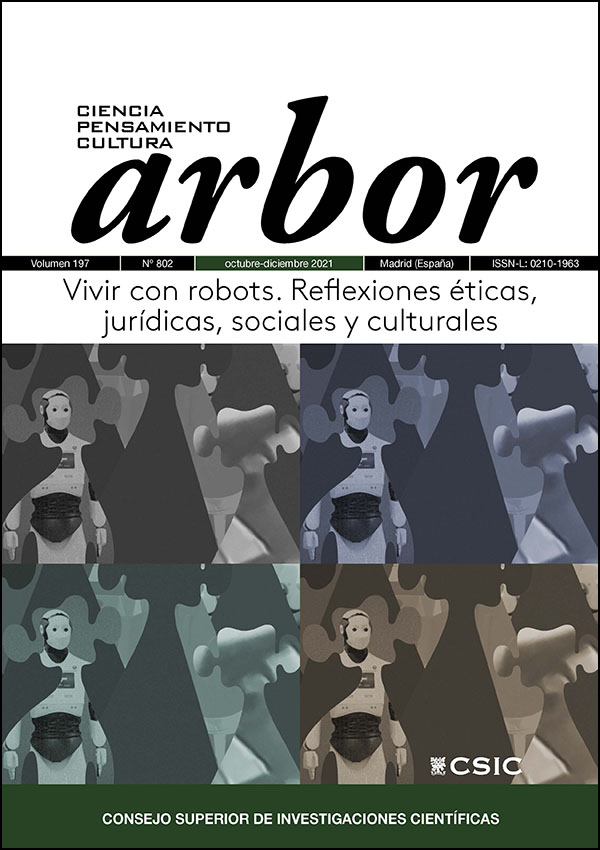Inclusive robotics: economic performance and employment
DOI:
https://doi.org/10.3989/arbor.2021.802004Keywords:
automation, robotization, Artificial Intelligence, AI, employment, equalityAbstract
In the current context, jurists are obliged to understand the phenomenon of digitalisation. To do so, they must first understand, define and delimit it, and then explain and analyse it in order to propose fair and equitable solutions. This global concept encompasses multiple realities, each with its own characteristics and specific impact, in particular in the field of work as a source of personal and social identity. Public and private institutions, as well as international, European and national ones such as the OECD, ILO, WEF, EU, among others, have been doing regular studies, reports and analyses of the situation for some time. With regard to Robotics, they have gone beyond the specific scope of the industrial sector to try to identify the impact of technologies that replicate human-like cognitive processes in machines, seen from a triple perspective: ethical, legal and socio-economic. Thus, emphasis is placed on their effects on the configuration and definition of work; on the different models or types of work, profoundly altered today by automation or digitalisation; and on the conditions in which workers provide their services. From this triple perspective, admitting that robots and Artificial Intelligence systems are one of the great truly disruptive inventions of the digital environment and that they are here to stay, this study focuses on Inclusive robotics, thus contributing to an understanding of the current technological change by reflecting on some of the issues it raises for the law.
Downloads
References
Álvarez Cuesta, Henar (2020). El impacto de la inteligencia artificial en el trabajo: desafíos y propuestas. Navarra: Editorial Aranzadi.
Comisión Europea (2020). Libro Blanco sobre la inteligencia artificial: un enfoque europeo orientado a la excelencia y la confianza. COM (2020) 65 final. Disponible en: https://ec.europa.eu/info/sites/default/files/commission-white-paper-artificial-intelligence-feb2020_es.pdf
De Asís, Rafael (2014). Una mirada a la Robótica desde los derechos humanos. Madrid: Dykinson.
Díaz, Alfredo y Grau Ruiz, María Amparo (2020). Social Security and robotization: Possible ways to finance human reskilling and promote employment. Paladyn, Journal of Behavioral Robotics, 11: 340-350. https://doi.org/10.1515/pjbr-2020-0020
García Piñeiro, Nuria (2020). Política de Empleo y Nuevas Tecnologías. En Erik Monreal, Javier Thibault y Ángel Jurado (coords): Derecho del Trabajo y Nuevas Tecnologías. Valencia: Tirant lo blanch, pp.163-187.
García-Prieto Cuesta, Juan (2018). ¿Qué es un robot? En: Moisés Barrio Andrés: Derecho de los Robots. Madrid: Wolters Kluwer, pp. 29-64.
Grupo Independiente de Expertos de alto nivel sobre IA (2019). Directrices éticas para una IA Fiable. Bruselas: Comisión Europea. Disponible en: https://urjes.com/pruebas/wp-content/uploads/2021/05/Grupo-independiente-de-expertos-...-Directrices-eticas-para-una-inteligencia-artificial-IA-fiable-ES.pdf.
Jurado Segovia, Ángel (2020). Robotización/automatización y despido objetivo por causas técnicas (Art. 52 c ET). Revista Labos, 1 (3): 13-35. Disponible en: https://e-revistas.uc3m.es/index.php/LABOS/article/view/5771/4126 https://doi.org/10.20318/labos.2020.5771
Lin, Patrick; Abney, Keith y Bekey George (2011). Robot Ethics: Mapping the issues for a mechanized world. Artificial Intelligence, 175 (5-6): 942-949. Disponible en: https://core.ac.uk/download/pdf/19157493.pdf. https://doi.org/10.1016/j.artint.2010.11.026
López Sánchez, José Ignacio; Grau Ruiz, María Amparo y Sánchez-Urán Azaña, María Yolanda (2019). The impact of robotics and computerization on the labor market: Inclusive Insight from a Law and Economics Perspective. Revista Derecho Digital e Innovación, 3: 30-60.
López-Sánchez, Jose Ignacio; Arroyo-Barrigüete, Jose Luis y Curto-González, Tomás (2020). Automation and inequality. UCJC Business and Society Review, 17 (4): 148-176.
Lund, Susan; Madgavkar, Anu; Manyika, James; Smit, Sven; Ellingrud, Kweilin y Meaney, Mary (2021). The Future of Work after COVID-19. Mckinsey Global Institute web. Disponible en: https://www.mckinsey.com/featured-insights/future-of-work/the-future-of-work-after-covid- [última consulta: septiembre 2021 ].
Montoya Melgar, Alfredo (2020). La dignidad del trabajo. Lección magistral con motivo de sus cincuenta años de Catedrático de Derecho del Trabajo. Murcia: Universidad de Murcia.
Muñoz Ruiz, Belén (2020). Robótica y Derecho del Trabajo: una revisión de los primeros fallos judiciales. Revista Trabajo y Derecho, 62: 67-77.
Organización Internacional del Trabajo (2019). Trabajar para un futuro más prometedor. Ginebra: Oficina Internacional del Trabajo. Disponible en: https://www.ilo.org/wcmsp5/groups/public/---dgreports/---cabinet/documents/publication/wcms_662442.pdf.
Palmerini, Erica (2017). Robótica y derecho: sugerencias, confluencias, evoluciones en el marco de una investigación europea. Revista de Derecho Privado, 32: 53-97. Disponible en: https://revistas.uexternado.edu.co/index.php/derpri/article/view/5021/6009 https://doi.org/10.18601/01234366.n32.03
Parlamento Europeo (2017). Informe del Parlamento Europeo con recomendaciones destinadas a la Comisión sobre normas de Derecho civil sobre robótica (2015/2103(INL)). Disponible en: https://www.europarl.europa.eu/doceo/document/A-8-2017-0005_ES.html.
Parlamento Europeo (2020). Informe con recomendaciones destinadas a la Comisión sobre un régimen de responsabilidad civil en materia de inteligencia artificial. Disponible en: https://www.europarl.europa.eu/doceo/document/A-9-2020-0178_ES.html [Última actualización: 19 de octubre de 2020 ].
Veruggio, Gianmarco (2006). The EURON Roboethics Roadmap. En Giulio Sandini y Aude Billard: Proceedings of the 2006 6th IEEE-RAS International Conference on Humanoid Robots, December 4-6, 2006, Genoa (Italy), pp. 612-617. Disponible en https://www3.nd.edu/~rbarger/ethics-roadmap.pdf https://doi.org/10.1109/ICHR.2006.321337
Veruggio, Gianmarco y Operto, Fiorella (2006). Roboethics: a bottom-up interdisciplinary discourse in the field of applied ethics in robotics. International Review of Information Ethics, 6 (12): 2-9. https://doi.org/10.29173/irie133
Verruggio, Gianmarco y Operto, Fiorella (2008). Roboethics: Social and Ethical Implications of Robotics. En Bruno Siciliano y Oussama Khatib (eds.): Springer Handbook of Robotics. Suiza: Springer International Publishing, pp. 1499-1524. https://doi.org/10.1007/978-3-540-30301-5_65
Published
How to Cite
Issue
Section
License
Copyright (c) 2022 Consejo Superior de Investigaciones Científicas (CSIC)

This work is licensed under a Creative Commons Attribution 4.0 International License.
© CSIC. Manuscripts published in both the printed and online versions of this Journal are the property of Consejo Superior de Investigaciones Científicas, and quoting this source is a requirement for any partial or full reproduction.All contents of this electronic edition, except where otherwise noted, are distributed under a “Creative Commons Attribution 4.0 International” (CC BY 4.0) License. You may read here the basic information and the legal text of the license. The indication of the CC BY 4.0 License must be expressly stated in this way when necessary.
Self-archiving in repositories, personal webpages or similar, of any version other than the published by the Editor, is not allowed.
Funding data
H2020 European Research Council
Grant numbers 780073
Ministerio de Ciencia e Innovación
Grant numbers PID2019-104287RB-100















